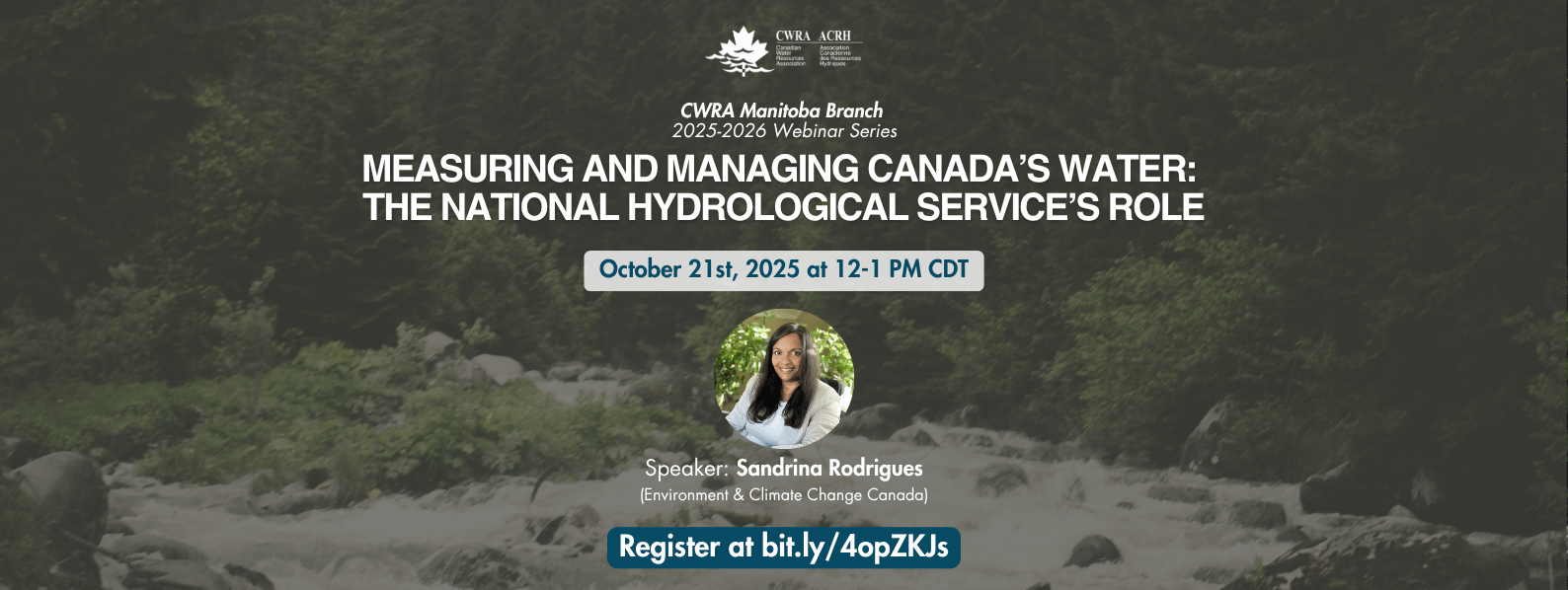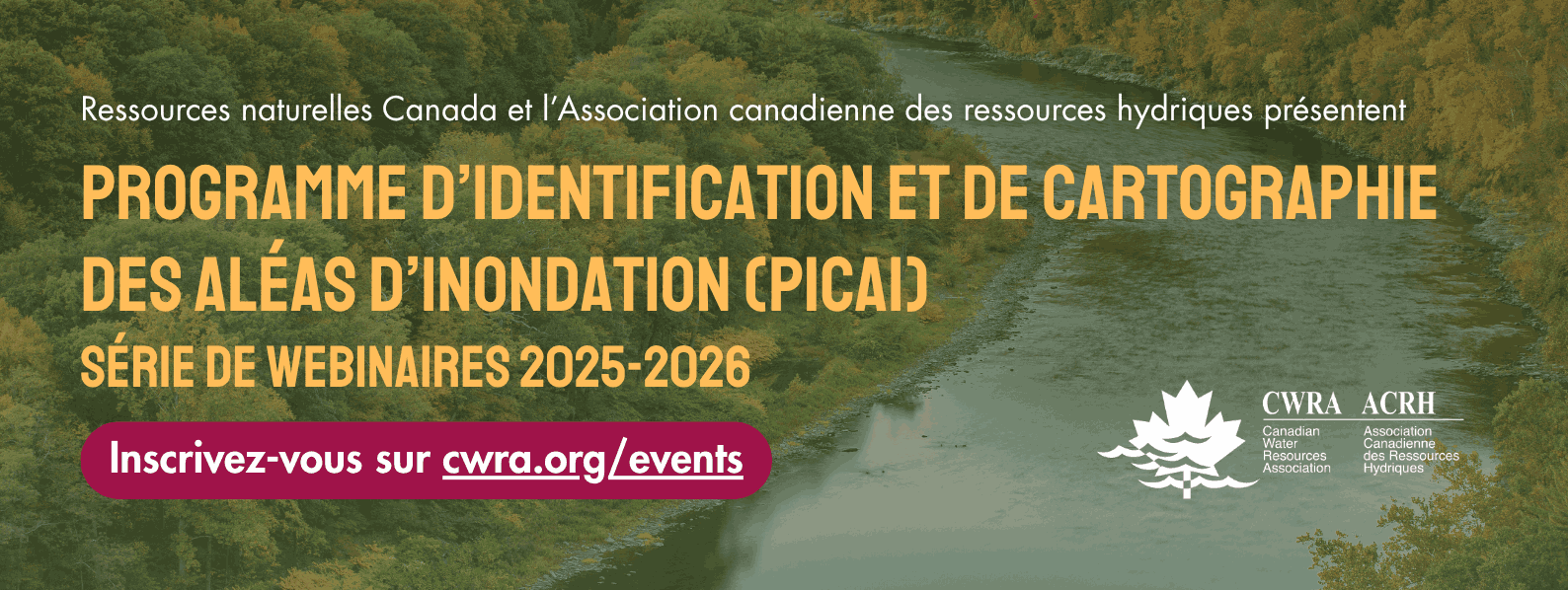Oct 29 to Nov 27, 2025 (Multiple Dates): NRCan-CWRA Webinar Series
The Canadian Water Resources Association (CWRA) is pleased to announce a two-part webinar series in collaboration with Natural Resources Canada’s (NRCan) Canada Centre for Mapping and Earth Observation (CCMEO). This series will educate current and prospective partners on the Flood Hazard Identification and Mapping Program (FHIMP), the Federal Flood Mapping Guidelines Series and other significant flood-related initiatives led by the CCMEO. The first installment of this webinar series will be hosted in Fall 2025 with the second part to come in early 2026.
This webinar series is targeted at flood mapping practitioners, researchers, interested parties, and the general public, offering an opportunity to tune in for presentations from subject matter experts at no cost to the participants.
This event is free and will be offered in both official languages. The recordings of the presentation and resources will be made available online after the session.
This webinar series is supported by Natural Resources Canada.
- Nicky Hastings (Physical Scientist, Natural Resources Canada)
- Speaker Bio: Nicky Hastings is a physical scientist with the Geological Survey of Canada at Natural Resources Canada, specializing in coastal science and disaster risk reduction. With over 15 years of experience in the field, she has become an expert in developing and adapting risk assessment methods to address coastal flooding and coastal change across Canada. Nicky’s work focuses on understanding and mitigating the impacts of coastal storm surges, sea-level rise, coastal change, and tsunami risks. She collaborates closely with internal teams, local government agencies, private sector representatives, and academic institutions to co-develop knowledge that can inform decision-making for disaster risk reduction and climate adaptation.
- Sean Ferguson (Research Officer, National Research Council Canada)
- Speaker Bio: Sean Ferguson is a Research Officer with National Research Council Canada’s Ocean, Coastal and River Engineering Research Centre. He specializes in applying physical and numerical modelling to support research related to riverine and coastal systems. He has participated in and led a wide variety of projects related to hazard assessment, flood and erosion risk management, river hydraulics, and sediment transport.
- Presentation Description: For this joint presentation, Sean Ferguson (NRC) and Nicky Hastings (NRCan) will provide an overview of the new guidelines for coastal flood hazard assessments using a risk-based analyses. We will showcase various community case studies that illustrate how these guidelines have been applied in real-world coastal flood hazard assessments,
- David Huard (Specialist, Ouranos)
- Speaker Bio: David Huard is a physicist working at Ouranos since 2009 on the development of climate services. He holds a PhD in water sciences and pursued postdoctoral work on Arctic sea ice modeling. His interests include uncertainty analysis, decision making and the use of climate data for operational purposes. David contributes to the development of a pan-Canadian online platform for climate services, and is a lead author of the IPCC 7th assessment.
- Louise Kreissig-Arnal (Hydrologist, Ouranos)
- Speaker Bio: Louise Arnal holds a PhD in Environmental Science from the University of Reading (2019), in collaboration with the European Centre for Medium-Range Weather Forecasts (ECMWF). More recently, she completed a postdoctoral fellowship at the University of Saskatchewan. As both an artist and a scientist, Louise also aims to foster scientific engagement by merging science and art. Louise joined Ouranos in 2023, where she primarily focuses on hydro-climatological modeling in Quebec.
-
- Presentation Description: This project aims to support the Quebec government in hydrological modeling of flood zones and hydroclimatic hazards in the context of climate change, in addition to providing the academic community with a research environment. The project is structured around two work packages: the use of physically based surface schemes for surface runoff simulation by the Canadian Regional Climate Model (CRCM); and the integration of these hydrological simulations into a larger ensemble in order to better account for the uncertainty of hydrological modeling in the characterization of flood zones.
- Steven Weijs (UBC)
- Speaker Bio: Dr. Steven Weijs is currently a Associate Professor in the Department of Civil Engineering at the University of British Columbia. His research interests are water resources management and hydrology, with a special focus on the dynamics of uncertainty and information within that context. The larger research question that he tries to address is how to optimally channel information flows from our observations of complex water systems and knowledge of underlying physics, to enable informed decisions about water resources. Dr. Weijs holds a Ph.D. and M. Sc. in Water Resources Management and Civil Engineering from TU Delft (Delft University of Technology) in the Netherlands. After his Ph.D. he was a AXA Postdoctoral Fellow at EPFL in Switzerland working on mountain hydrology for 4 years, before joining UBC.
-
- Presentation Description: In this presentation, we look at a number of data driven methods to predict the distribution of daily streamflow in ungauged basins in British Columbia and the Yukon, including machine learning of daily flow hydrographs and parametric distributions. Probability distributions are compared with reference distributions using relative entropy, also known as Kullback-Leibler divergence. I discuss interpretation of these metrics and issues around low-probability events and intermittent flow regimes.
- Maxim Fortin (Natural Resources Canada)
- Speaker Bio: Maxim is an engineer with 15 years of experience in the fields of water resources and flood management in Canada and internationally. Since 2021, he works as an engineering advisor with the Canada Centre for Mapping and Earth Observation at Natural Resources Canada (NRCan). At NRCan, he provides technical leadership for the implementation and rollout of the Flood Hazard Identification and Mapping Program (FHIMP) – Canada’s flagship initiative to support and increase flood hazard mapping coverage in the country.
- Presentation Description: Since 2021, the Flood Hazard Identification and Mapping Program (FHIMP) has been updating Canada’s flood mapping in partnership with provinces and territories, prioritizing high-risk areas and public accessibility. Advances in numerical modeling and computing performance now enable fast flood modeling at regional and global scales, providing new types of hazard information to fill gaps between local & detailed engineering maps. Multiple modeling scales and levels of detail are being developed and adopted by stakeholders at local, provincial/territorial, and federal levels, supporting regional efforts and national applications for insurance, disaster assistance, and public awareness. This presentation highlights recent developments across modeling scales in Canada, with an emphasis on regional approaches. We outline how these methods can be combined into a seamless, adaptable flood mapping framework that matches detail to use cases and jurisdictional needs.
- Robert Chlumsky (Heron Hydrologic)
- Speaker Bio: Dr. Robert Chlumsky is a Water Resources Engineer with a wide range of experience in water resources applications, and is currently President of Heron Hydrologic. Robert completed his PhD at the University of Waterloo in 2024, where he researched the blended hydrologic model structure and also developed the Blackbird software for large-scale and real-time flood mapping. Robert has completed many projects using the Raven hydrologic modelling framework, and has also delivered courses to professionals and students on topics ranging from hydrology to data analysis. Robert is also the Past President of the Canadian Water Resources Association Ontario Branch.
- Presentation Description: The presentation will cover the methodology behind Blackbird, and also discuss the research undertaken in the Mad River watershed for low-gradient flood mapping. Modifications to Blackbird that highlighted issues with the underlying Height Above Nearest Drainage (HAND) method will be presented, including a discussion of how this may impact other flood mapping projects across Canada.
Don’t Miss Out!
This webinar series offers a unique opportunity to explore critical advances in flood mapping science. We hope you’ll join us for part 1 this Fall.
For more information, please contact info@cwra.org
More About the Flood Hazard Identification and Mapping Program (FHIMP)
The Flood Hazard Identification and Mapping Program (FHIMP) is a collaborative, Government of Canada initiative led by Natural Resources Canada (NRCan), in partnership with Public Safety Canada and Environment and Climate Change Canada (ECCC). The FHIMP is investing in updating Canada’s existing flood mapping capabilities.
In partnership with provincial and territorial governments, the FHIMP aims to complete flood hazard maps of higher-risk areas in Canada and make this flood hazard information accessible. These maps will help emergency planning by guiding the placement of evacuation routes and support land use planning by identifying locations for building critical infrastructure and flood mitigation structures like dikes. Flood maps provide reliable information on flood hazards and support decision-makers and Canadians in their efforts to adapt to a changing climate while protecting properties and lives.
Another important element of the FHIMP is its support for universities, research institutes and non-profit organizations working to advance flood science. Through targeted funding, FHIMP enables the development of regional flood models, improved methods for incorporating climate change impacts, and tools to address uncertainty in flood hazard mapping. This investment is helping to bridge the gap between research and practice by ensuring that new scientific approaches are tested, refined, and shared with users across the country.
The upcoming webinars will showcase some of this work, highlighting innovative projects funded by FHIMP and demonstrating how these efforts contribute to more accurate, resilient, and future-focused flood maps.
More About the Canadian Water Resources Association
The Canadian Water Resources Association (CWRA) is a national registered charity comprised of members from the public, private and academic sectors who are committed to promoting responsible, innovative, and effective water resources management.
Formed in 1947 as the Western Canada Reclamation Association, CWRA is the only national organization addressing all water resources issues across all regions of Canada. We offer a range of services and programs focused on professional development, providing expertise and advice, education, and collaboration.




